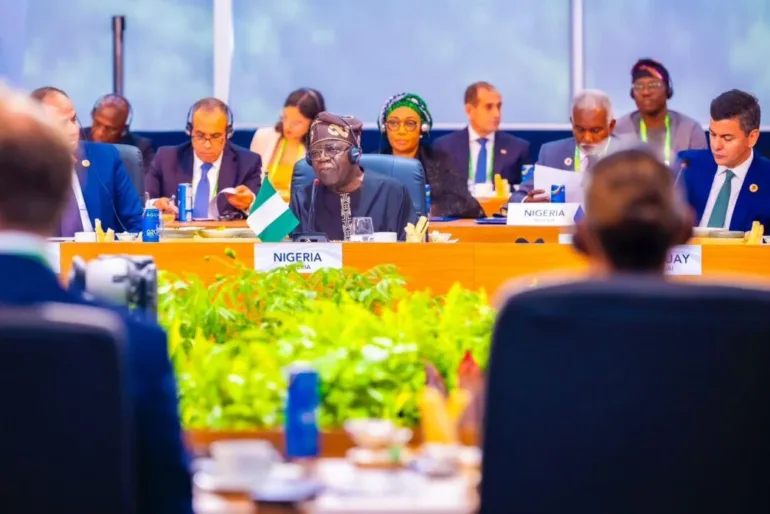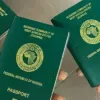President Bola Tinubu has commended the establishment of the Global Alliance Against Hunger and Poverty, a new initiative spearheaded by Brazilian President Luiz Inácio Lula da Silva, aimed at addressing two of the world’s most pressing challenges. Tinubu described the alliance as a critical step forward in the global fight against hunger and poverty.
The Nigerian leader made the remarks on Monday during the opening session of the 19th G20 Leaders’ Summit in Rio de Janeiro, Brazil, where he praised Brazil’s leadership in tackling these urgent issues. Tinubu stressed that the creation of the Alliance represents a bold and visionary approach to combating global hunger and poverty, which remain persistent challenges for vulnerable populations worldwide.
“This bold initiative underscores Brazil’s leadership in addressing one of the most urgent and persistent global challenges,” President Tinubu said. “The formation of this Alliance is a significant milestone in our shared efforts to eradicate hunger and poverty. It is a powerful message of solidarity for those most in need, and it offers a comprehensive strategy to not only address immediate needs but also tackle the structural causes of these issues.”
Tinubu further emphasized the importance of global collaboration between governments, international organizations, and civil society to achieve lasting solutions. “This initiative offers a holistic approach to hunger and poverty, combining immediate relief with long-term solutions,” he added.
The Nigerian President highlighted that the Global Alliance aligns with one of the eight priority areas he outlined in his inaugural address 18 months ago. He affirmed Nigeria’s commitment to leveraging international cooperation and best practices to advance its economic development.
“Nigeria is fully committed to this cause, and our endorsement of the Global Alliance is a crucial step in addressing hunger and poverty within our borders. It also demonstrates our dedication to achieving the United Nations’ Sustainable Development Goals (SDGs), particularly SDG 1—ending poverty—and SDG 2—achieving zero hunger,” President Tinubu stated.
He noted that Nigeria’s support for the Alliance would enable the country to benefit from global resources, innovative solutions, and partnerships aimed at accelerating progress towards these SDGs.
“In partnership with international actors, Nigeria aims to harness these opportunities to improve the quality of life for our citizens and combat hunger and poverty more effectively,” Tinubu said. “This endorsement reinforces Nigeria’s role as a key player in global efforts for sustainable development.”
In his address, President Tinubu also called for comprehensive reforms to the United Nations Security Council (UNSC) to make it more inclusive and reflective of global diversity. He reiterated Nigeria’s readiness to represent Africa within this vital institution, emphasizing the need for equitable representation.
“The Security Council must expand its permanent and non-permanent member categories to reflect the world’s diversity,” Tinubu said. “Africa deserves priority in this process, and we call for two permanent seats to be allocated to it, with equal rights and responsibilities. Nigeria stands ready to serve as Africa’s representative in this capacity.”
The President’s remarks were delivered on his behalf by Nigeria’s Minister of Foreign Affairs, Ambassador Yusuf Tuggar. Tinubu lauded the G20’s decision to grant permanent membership to the African Union and to continue inviting guest countries to join the group, noting that such inclusive participation enriches global discourse on shared challenges.
“We welcome the G20’s consistent efforts to foster a more inclusive multilateral framework,” he said. “The expansion of the Security Council and greater representation for Africa are essential for a balanced and effective global governance system.”
President Tinubu also drew attention to the structural inequities in the international economic system, particularly the challenges faced by developing countries in the areas of global taxation and trade imbalances. He highlighted the damaging impact of unfair tax policies on developing nations, particularly those related to digital economies.
“The international tax system, shaped by the interests of more affluent nations, often leaves developing countries at a disadvantage, resulting in significant revenue losses,” Tinubu stated. “This imbalance hampers our ability to achieve sustainable development and economic self-reliance.”
The President revealed that Nigeria, along with other African nations, has championed a historic initiative at the United Nations to create a framework convention on tax reform aimed at establishing a more equitable global tax system. He called on the G20 to support efforts by countries in the Global South to reform the international financial architecture.
“We must bridge the gap between the Global North and South. This is the path to a more just and sustainable future, and the G20 must play a leading role in this process,” Tinubu said. “Nigeria is committed to being part of this future, actively engaging in the G20, and steadfastly supporting the achievement of the 2030 SDG targets.”
The President concluded by urging the international community to continue working together to tackle global challenges such as extreme poverty, inequality, climate change, terrorism, and conflicts, all of which are compounded by the inequities within the global governance system.
“Addressing these issues requires a collective and pragmatic approach,” President Tinubu affirmed. “Nigeria is ready to contribute to these efforts and work alongside its global partners to build a more equitable and sustainable world for all.”


